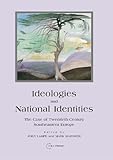Ideologies and National Identities : The Case of Twentieth-Century Southeastern Europe / ed. by John R. Lampe, Mark Mazower.
Material type: TextPublisher: Budapest ; New York : Central European University Press, [2004]Copyright date: 2004Description: 1 online resource (320 p.)Content type:
TextPublisher: Budapest ; New York : Central European University Press, [2004]Copyright date: 2004Description: 1 online resource (320 p.)Content type: - 9786155053856
- 320.949 22
- online - DeGruyter
| Item type | Current library | Call number | URL | Status | Notes | Barcode | |
|---|---|---|---|---|---|---|---|
 eBook
eBook
|
Biblioteca "Angelicum" Pont. Univ. S.Tommaso d'Aquino Nuvola online | online - DeGruyter (Browse shelf(Opens below)) | Online access | Not for loan (Accesso limitato) | Accesso per gli utenti autorizzati / Access for authorized users | (dgr)9786155053856 |
Frontmatter -- Table of Contents -- Preface -- Introduction. Reconnecting the Twentieth-Century Histories of Southeastern Europe -- A Guide to Further Reading -- 1 Charisma, Religion, and Ideology: Romania’s Interwar Legion of the Archangel Michael -- 2. “We Were Defending the State”: Nationalism, Myth, and Memory in Twentieth-Century Croatia -- 3. Young, Religious, and Radical: The Croat Catholic Youth Organizations, 1922–1945 -- 4. Common Heroes, Divided Claims: IMRO Between Macedonia and Bulgaria -- 5. How to Use a Classic: Petar Petrovic´ Njegosˇ in the Twentieth Century -- 6. “The Happy Child” As an Icon of Socialist Transformation: Yugoslavia’s Pioneer Organization -- 7. Popular Culture and Communist Ideology: Folk Epics in Tito’s Yugoslavia -- 8. Sounds and Noise in Socialist Bulgaria -- 9. Greater Albania: The Albanian State and the Question of Kosovo, 1912–2001 -- 10. Struggling with Yugoslavism: Dilemmas of Interwar Serb Political Thought -- 11. Communist Yugoslavia and Its “Others” -- List of Contributors -- Index
restricted access online access with authorization star
http://purl.org/coar/access_right/c_16ec
Twentieth-century Southeastern Europe endured three, separate decades of international and civil war, and was marred in forced migration and wrenching systematic changes. This book is the result of a year-long project by the Open Society Institute to examine and reappraise this tumultuous century. A cohort of young scholars with backgrounds in history, anthropology, political science, and comparative literature were brought together for this undertaking. The studies invite attention to fascism, socialism, and liberalism as well as nationalism and Communism. While most chapters deal with war and confrontation, they focus rather on the remembrance of such conflicts in shaping today's ideology and national identity.
Mode of access: Internet via World Wide Web.
In English.
Description based on online resource; title from PDF title page (publisher's Web site, viewed 20. Nov 2024)


